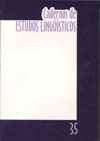Resumo
My central concern in this paper is to argue that no linguistic argument (in the sense of ‘argument made in and through language’) is so hermetically sealed as to be proof against all further critical interventions. In fact, the very structure of an argument is such that it is for ever open and ready to receive further extensions. Contrary to what we are frequently led to believe, however, the ways in which an argument may be extended or ‘enriched’- as in the case of so-called enthymemes - are not predetermined or delimited by the intrinsic properties (structural, semantic, or whatever) of the particular argument in question. The possible extensions of an argument are, in principle, limitless, though in actual practice they may indeed turn out to be, to a considerable extent and within a resonable margin of error, predictable. I argue that the concept of “semantic retroaction”, as recently developed by Oswald Ducrot and his colleagues, naturally paves the way for the sort of ‘‘open-endedness’’ that I claim to be the hall-mark of all argumentative structures.Referências
AUWERA, v. der (1985). Language and Logic: A Speculative Condition-Theoretic Study. Amsterdam: John Benjamins Publishing Co.
BRUXELLES. S., DUCROT, O, e RACCAH, P-Y (1995). ‘Argumentation and the lexical topical fields’. Journal of Pragmatics. 24(1/2). Pp. 99-114.
DE MATTOS, C.L. (1957). Vocabulário Filosófico. São Paulo: Ed. Leia.
DEWEY, J. (1958). Experience and Nature. Nova Iorque: Dover.
GOLDMAN, A.I. (1994). ‘Argumentation and social epistemology’. Journal of Philosophy. XCI. nº 1. Pp. 27-49.
GOVIER, T. (1989). ‘Critical thinking as argument analysis?’ Argumentation. III. Pp. 115-126.
HARMAN, G. (1984). ‘Logic and reasoning’. Synthese. LX. Pp. 107-127.
MACKENZIE, J. (1989). ‘Reasoning and logic’. Synthese. LXXIX. Pp. 99-117.
PARSONS, T. (1996). ‘What is an argument?’ Journal of Philosophy. XCIII no. 4. Pp. 164-185.
WALTON, D. N. (1987). Informal Fallacies: Towards a Theory of Argument Criticisms. Amsterdam: John Benjamins Publishing Co.
______. (1990). ‘What is reasoning? What is an argument?’ Journal of Philosophy Vol. LXXXVII. no. 8. Pp. 399-419.
WIERENGA, L. (1991). ‘The rhetoric of the commonplace: argumentation and ideology’. Em L. Hunter (Orga.). Toward a Definition of Topos. Londres: Macmillan. Pp. 158-181.
WRIGHT, L. (1995). ‘Argument and understanding: a plea for understanding.’ Journal of Philosophy. XCII. no. 11. Pp. 565-585.
O periódico Cadernos de Estudos Linguísticos utiliza a licença do Creative Commons (CC), preservando assim, a integridade dos artigos em ambiente de acesso aberto.

